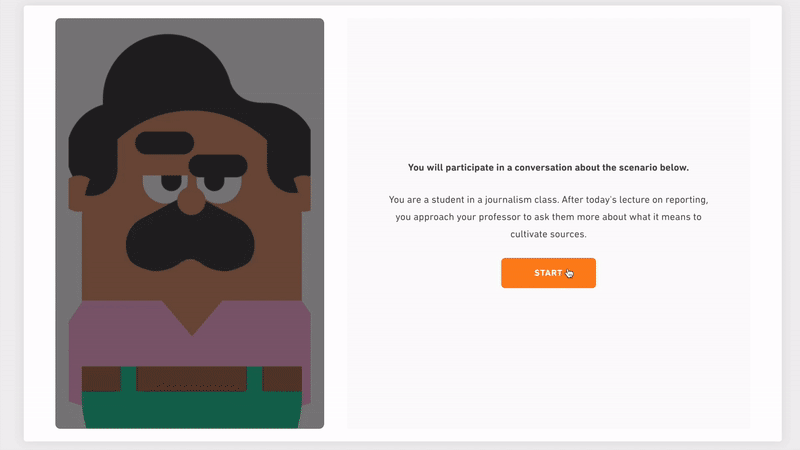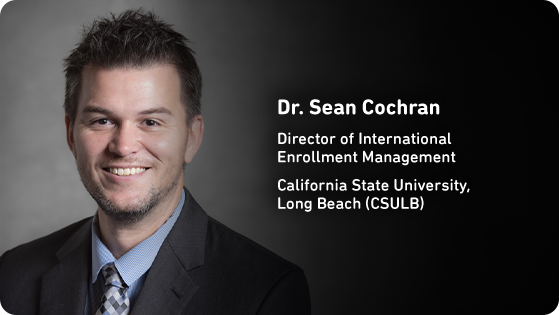Dr. Sean Cochran is Director of International Enrollment Management at California State University, Long Beach (CSULB), strategically managing the university's international recruitment efforts, international admissions, CSULB's global agent network. He holds an EdD in educational leadership from Concordia University Irvine and an MA in Applied Linguistics from California State University, Fullerton.
During the pandemic, many campuses, including my own, adopted exams like the Duolingo English Test (DET) temporarily because, quite frankly, we didn’t have a choice. We needed something to show the student’s English level was sufficient for their program of study, and unlike traditional tests that are administered in a center, the DET can be taken safely from home.
As we emerged from lockdown, higher ed institutions around the world began the puzzling process of reconsidering the emergency policies and procedures they had adopted during the pandemic. Some things, like hybrid work schedules and the online modality of certain degree programs, seem to be here to stay; other changes have been dropped entirely.
When it comes to the continued use of online tests, there still seems to be some disagreement. In conversations with my colleagues and counterparts, I have found there are still many misconceptions about these online or “at-home” tests. But over the last couple of years, I’ve had the opportunity to learn more about the features of these tests, as well as the science and technology behind them. As I’ve unlearned many of the myths surrounding this exam, I have come away with a greater appreciation and trust in this high-stakes assessment.
Myth One: The DET is part of the Duolingo language learning app
Contrary to popular belief, the DET is not part of the Duolingo language learning app. While some students may use the app to practice their English skills, the DET is a separate entity. It is designed to assess English proficiency and can only be taken on a computer, not on a mobile device.
This distinction is crucial as it underscores the seriousness and formality of the DET as a legitimate testing tool, separate from the casual learning environment of the app. The fun and silly sentences used in the famous language learning app are not the kind of language the DET tests; it is designed to assess proficiency for entry into English-medium academic settings.
Myth Two: The DET isn’t hard or lengthy enough
Some of my colleagues have seen examples of DET items that seem very elementary, and not at all at the level appropriate to test a future college student studying in the US. The concern, of course, is understandable. We want to make sure that if we admit students based on the results of taking an English test, they are going to be successful on our campuses.
It is important to remember, however, that the DET employs computer adaptive testing, meaning the test adjusts its difficulty based on the test taker’s ability. This ensures that the test is as challenging as it needs to be for each individual. A student with a beginner level of English will not see the same complex language we would rightfully expect for someone bound to higher education in the US.

An internal assessment recently conducted at my institution, CSU Long Beach, found there was no statistically significant difference in academic performance between students admitted with DET or other tests. Furthermore, we were pleased to see that the newest version of the DET includes more scored writing tasks, tapping into applicants’ higher-level writing skills. This addition increases the test length and complexity, further challenging the test taker’s proficiency.
Myth Three: The test isn’t secure enough
Admission officers can be understandably concerned about test security when an exam is taken online from home, on a student’s personal computer. But over the last couple of years, I have come to understand that security is a top priority for the DET and other testing companies. While attending a DET open house, I learned about the extensive suite of tools Duolingo has developed to mitigate modern test security threats.
For example, the DET uses a custom desktop app that locks the computer and secures the testing environment, and employs an entire team of experts who are constantly monitoring and developing the technology to prevent cheating. It also employs something called human-in-the-loop AI and utilizes remote online proctoring to ensure test integrity.
Every application cycle at my institution there have been numerous alerts of DET tests not being certified due to rule violations, which reassures us that the test’s security measures are working. These stringent measures demonstrate the DET’s commitment to maintaining a secure testing environment.
Myth Four: The DET is not academic
I hear this one a lot! As a former ESL professor, I understand that conversational English isn’t sufficient for international students to do well on a college campus. For students to thrive, they must perform specific language-based tasks with the appropriate vocabulary.
For some of my colleagues, the idea of an “academic English test” simply means that students are asked to write lengthy essays while also listening and responding to short lectures. But what about the student’s ability to negotiate through an office hour visit with their professor or discuss a course project with a classmate?
The DET is designed to assess both General English and English for Academic Purposes. Although it doesn't have a lengthy essay like traditional tests, it does measure speaking, writing, reading, and listening skills through distinct task types in an academic setting. This ensures that students can be successful in real-world situations on campus, such as advocating for themselves, using office hours, and conversing with their peers.

In addition to the test score report, institutions also receive a writing sample and speaking sample from each applicant. The latter can be very helpful for graduate programs, for example, that found video statements of purpose are a better indicator of how international students will perform on campus, over the traditional one-page essay.
Myth Five: Schools are no longer using it
As I mentioned in the introduction, schools that adopted online test scores during the pandemic have had to decide whether to continue accepting these tests. A common assumption I’ve encountered is that most are dropping DET and others, but that doesn’t seem to be the case at all.
Many of us seem to think that the DET, like other online at-home English tests, is new and created only because of the pandemic. However, the DET was launched years before the pandemic in 2016 and is now accepted at over 5,000 universities and institutions. Unlike other tests that were converted to be online, the DET was always intended to be digital.

I changed my mind—you should, too!
Through my first hand experience, and despite my previous reluctance, I have come to believe that the DET is a reliable, secure, and comprehensive tool for assessing English proficiency. Perhaps it is time for all of us to embrace the benefits of online testing. As we move further into the digital age, online testing will continue to evolve and improve, and it’s crucial that we keep an open mind and stay informed about these developments.
